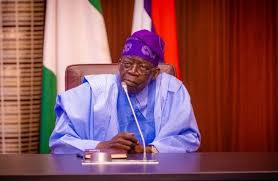
Tinubu - Nigeria pursuing climate-smart practices for Food Security.
In order to improve food security and lessen environmental effects, President Bola Tinubu has reiterated his administration's commitment to putting climate-smart agriculture techniques into place.
According to him, these actions are a result of Nigeria realising its obligation to spearhead sustainable development and a fair energy transition in Africa.
Tinubu made this statement while speaking at the current Abu Dhabi Sustainability Week in the United Arab Emirates' capital.
The President underlined the necessity of international cooperation to achieve sustainable development and minimise the implications of climate change in his 12-minute speech, "Climate Imperatives into Economic Prosperity, Bridging Africa's Global Energy Future."
President Tinubu emphasised Nigeria's obligation to show leadership in tackling climate concerns, recognising the country's position as Africa's most populous country and one of its biggest economies.
He proposed, “To succeed, we must innovate, collaborate and decide decisively to collaborate as a global community. As Africa’s most populous nation and one of its largest economies, Nigeria recognises its responsibility to demonstrate the required leadership on these matters.
“We have embraced the vision of sustainability and that alliance of global aspiration while addressing the local realities. Our efforts are anchored on three pillars: energy transition, climate resilience and sustainable development.
“In my administration, we recognise this problem. From inception, we have recognised the importance of reducing carbon emissions and a just transition to clean and renewable Energy, promoting environmental sustainability and economic growth energy transition.”
Addressing the specifics of Nigeria’s energy transition plan, he stated that Nigeria is employing climate-smart agricultural practices to bolster food security while reducing environmental impacts.
“Nigeria is implementing climate-smart agricultural practices to enhance food security while reducing environmental impacts.
“The government has approved several development policies, such as the national clean cooking gas policy, which aims to promote a clean energy environment and its benefit and socioeconomic development in our region,” said Tinubu.
According to him, implementing contemporary, environmentally friendly farming methods is crucial to shielding nearby communities from the negative consequences of climate change.
He emphasised that the country's future entails responsibly lowering carbon emissions while promoting economic growth and guaranteeing social fairness, characterising these actions as cornerstones of Nigeria's sustainable development approach.
According to him, Nigeria is lowering its dependency on fossil fuels and diversifying its energy sources, like many other countries.
The country's national development policy is anchored on this shift to cleaner alternatives, which also fits with the goal of achieving net-zero emissions by 2060.
To help achieve these objectives, Nigeria is building electric vehicle and compressed natural gas infrastructure. He pointed out that the government has also made investments in the ethical exploration of solid minerals and vital metals that are necessary for progressing the green energy transition.
As he put it, "Dear delegates and excellencies, our energy transition plan prioritises the shift to cleaner energy sources as a cornerstone of our national development strategy. Like many other countries, we aim to diversify our energy sources and reduce our dependency on fossil fuels."
"In accordance with international climate goals, Nigeria is dedicated to attaining net zero emissions by 2060; we are building the infrastructure to use electric vehicles and compressed natural gas."
According to him, development measures like the National Clean Cooking Gas Policy are intended to support clean energy, the region's socioeconomic growth, and environmental advantages.
He underlined initiatives to guarantee that policies advance fairness and social justice, leaving no one behind, while highlighting inclusivity.
The President also mentioned the declining Lake Chad as a clear illustration of Nigeria's environmental problems, which include pollution, flooding, coastline erosion, deforestation, desertification, and other negative effects of climate change.
Every year, Lake Chad becomes smaller, and people's livelihoods are still in danger. In order to achieve these results and assist us in becoming more resilient to environmental concerns, our government is collaborating with local communities to put solutions into place.
"We must concentrate on incorporating sustainable practices into every area of our industry if we want to provide resources to support a green economy in Africa.
"We need international support from partner countries, including national organisations, developmental partners, and individuals who share our vision of a sustainable, prosperous, and equitable future," Tinubu stated, referring to the capital-intensive nature of these investments.
President Tinubu also urged investors to work together further, pointing out that Nigeria was the first African nation to finance green projects through Sovereign Green Bond issuances, with its third issuance currently in progress.
"We encourage investors to collaborate with us," he explained, adding that Nigeria was the first nation in Africa to use the proceeds of its third green bond offering to start supporting green projects.
In this sense, our government is still dedicated to creating an atmosphere that allows companies to prosper, and utilising innovation and technology is key to driving sustainable development.”
The President emphasised that technological innovation is vital for advancing sustainable development, citing Nigeria’s growing adoption of new technologies in clean energy, water conservation, land restoration, waste management, and the circular economy.
“We agree that Nigeria is increasingly embracing new technologies like clean energy, water, conservation, land and forest restoration, waste management and circular economy.
“We partner with global leaders and are harnessing the power of technology. We are finding new and innovative ways to address our environmental challenges.
“We have arable agricultural lands for advanced technological farming, including the brighter future for artificial intelligence,” the Nigerian leader noted.
Through global partnerships and the strategic use of technology, he said Nigeria seeks innovative ways to address environmental challenges and secure a brighter future, including AI-driven agricultural practices.
Regarding international cooperation, he reminded participants that environmental issues are a global concern.
He maintained that cooperative activity based on respect for one another and a common future vision is necessary for workable solutions.
Nigeria considers sustainable development to be a worldwide necessity rather than just a domestic issue.
In order to achieve the Sustainable Development Goals and mitigate the effects of climate change, Tinubu called on the international community to increase collaboration at the regional and global levels.
President Tinubu concluded by considering the children's enduring impact, who waved the UAE flag on the opening day of the event, urging everyone to preserve the environment for coming generations.
He said he hoped this picture will remind people of their obligation to create a sustainable world for future generations and children.
The Nigerian leader also conveyed his sincere appreciation to Sheikh Mohammed bin Zayed Al Nahyan, the president of the United Arab Emirates, for inviting him to Abu Dhabi Sustainability Week.
World leaders gathered at the gathering to share ideas and viewpoints on how to tackle global issues.
Alongside President Tinubu, other leaders are also present at the conference, including Prime Ministers Georgia Melon of Italy, Paul Kagame of Rwanda, Anwar Ibrahim of Malaysia, Christopher Luxon of New Zealand, and Petteri Orpo of Finland.





